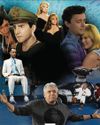Parents who lose a child to a school shooting discover a bond that transcends ideology.

MITCHELL DWORET AND MELISSA WILley have never met and don’t have much in common. Dworet, whom everyone calls Mitch, is an outgoing real estate agent from a busy part of Florida; Willey is a reserved stay-at-home mother of nine from a small town in southern Maryland. But one thing unites them: both had kids on a high school swim team, and now both of those kids are dead.
Dworet’s 17-year-old son Nicholas was killed during the shooting at Marjory Stoneman Douglas High School in Parkland, Fla., in February. Soon after, some parents of other children who had been victims of gun violence contacted Dworet, offering him support, guidance and understanding. A month later, 1,000 miles north in Maryland, Willey’s daughter Jaelynn, 16, was shot to death by a fellow student at Great Mills High School. When Dworet heard about it, he contacted Willey on Facebook. “I felt like I should reach out,” he says. “I wanted to pay it forward.”
An invisible network of similar threads connects hundreds of grieving parents across America. The connection is not formal. There is no organizational structure, no listserv, no roster of names. But their bond is strong enough that they often describe themselves—glibly but also in earnest—as “the club.” There is only one criterion for membership: you sent a child to school one day and then never saw them again because of a bullet, leaving you with pain, loss and perhaps even other shattered children. “It’s a club you spend your whole life hoping you won’t ever become a part of,” says Nicole Hockley, whose son Dylan, 6, was killed in the December 2012 shooting at Sandy Hook Elementary School in Connecticut. “But once you’re in, you’re in.”
この記事は Time の December 10, 2018 版に掲載されています。
7 日間の Magzter GOLD 無料トライアルを開始して、何千もの厳選されたプレミアム ストーリー、9,000 以上の雑誌や新聞にアクセスしてください。
すでに購読者です ? サインイン
この記事は Time の December 10, 2018 版に掲載されています。
7 日間の Magzter GOLD 無料トライアルを開始して、何千もの厳選されたプレミアム ストーリー、9,000 以上の雑誌や新聞にアクセスしてください。
すでに購読者です? サインイン

How Trump Won
THE FORMER PRESIDENT'S RE-ELECTION IS THE NEXT STEP IN A POLITICAL CAREER UNLIKE ANY OTHER IN AMERICAN HISTORY

Zak Brown The McLaren Racing CEO on Formula One in the U.S., his team's chase for a championship, and the future propulsion of the automobile
The McLaren F1 team is in the running for its first Formula One constructors' championship since 1998. What's that like? I'm kind of living on the edge of my seat. That's why sport is always going to be one of the most engaging forms of entertainment for people around the world.

Say Nothing speaks volumes
IN 1972, AT THE BLOODY HEIGHT OF the Troubles, home invaders abducted a widowed mother of 10 named Jean McConville from her Belfast apartment. Her children never saw her alive again.

Portrait of the artist in his ninth decade
AS A CURATOR AT THE PHILADELPHIA MUSEUM OF ART, Eleanor Nairne is very particular about how an artwork should be placed. \"I always say that you have to ask the work if it's sat comfortably,\" she says.

No rest for the songs of Wicked
THE WICKED WITCH OF THE WEST HAS BEEN A FIXTURE in American culture for nearly 125 years. After coming to life in 1900 with L. Frank Baum's novel The Wonderful Wizard of Oz, she rose to prominence onscreen in 1939, portrayed by Margaret Hamilton as a sinister old lady intent on ruining an innocent girl's wish to go home.

SENTIMENTAL VALUE
With Here, Robert Zemeckis stays true to his unlikely blend of new technologies and old-fashioned storytelling

TIME 100 CLIMATE
These are the 100 most influential leaders driving business climate action

BABY TALK
UNSURE ABOUT HAVING KIDS? THERAPIST MERLE BOMBARDIERI CAN HELP YOU FIGURE IT OUT

The many horrors of the Pelicot rape trial
THE TRIAL OF DOMINIQUE PELICOT, THE MAN IN THE South of France who pleaded guilty in September to charges of secretly drugging his wife of 50 years, Gisele, and, over the course of about a decade, filming dozens of men as they had sex with her while she was sedated, would have been disturbing enough just as the story of an epically vile husband.

Health Matters
COVID-19 MAY NOT BE A PUBLIChealth emergency anymore, but you still need your yearly shot. In fact, it seems to peak about twice a year: once during the traditional respiratory-disease season in the fall and winter, and once during summer.